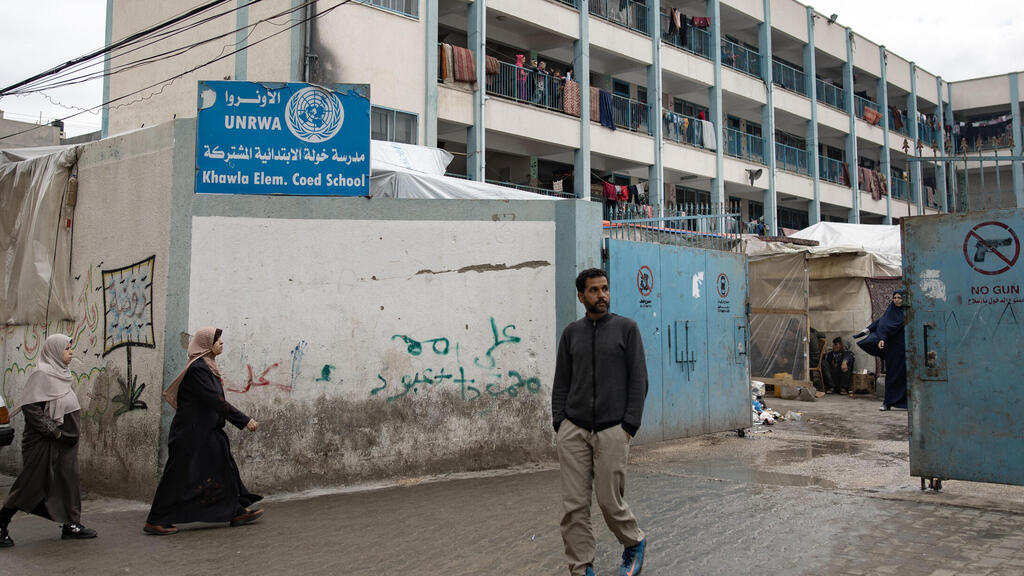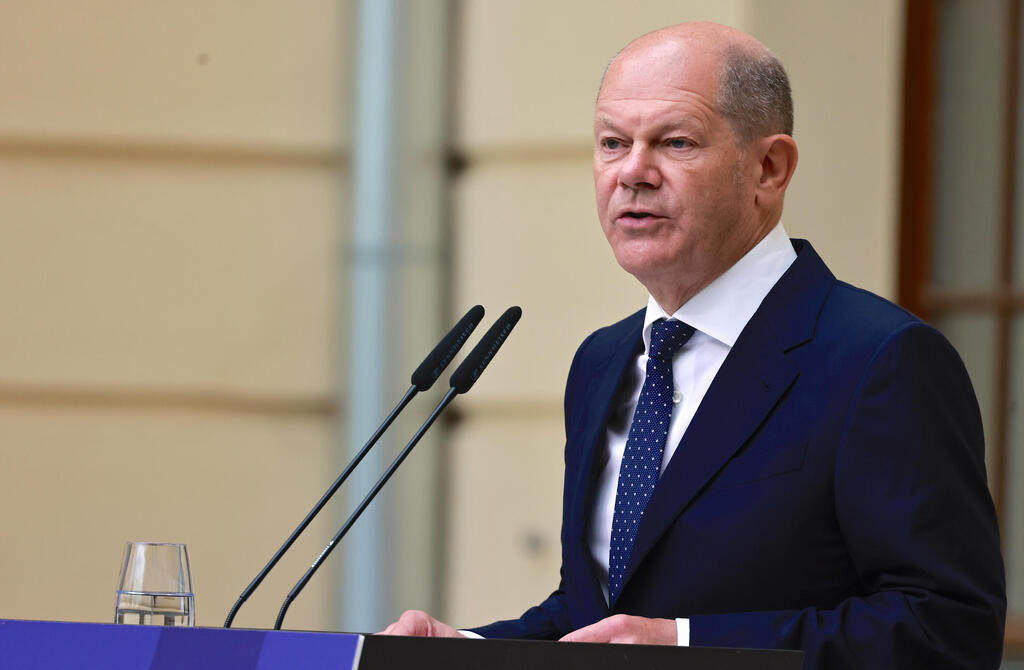In a move reminiscent of a plot twist in a blockbuster film, the German government on Wednesday stepped forward as the first to recommit its financial support to the United Nations Relief and Works Agency for Palestine Refugees (UNRWA) in Gaza. This decision came on the heels of a UN report that cleared UNRWA workers of allegations, previously made by Israel, connecting them to terrorist activities in the region. Despite earlier concerns leading some nations to pause their funding after reports of the involvement of some UNRWA employees in the October 7 massacre, these countries resumed their contributions even before the report's findings were released.
Demonstration near UNRWA offices in J'lem
(Video: Rafi Kotz)
On Monday, a report from the UN's independent inquiry committee – led by Catherine Colonna, the former French foreign mMinister – heralded UNRWA as a beacon of neutrality, "more neutral than other similar UN entities or non-governmental organizations." The findings were so compelling that UN Secretary-General Antonio Guterres immediately sought to implement its recommendations and issued a call to global stakeholders to bolster their support for UNRWA, describing the agency as a vital lifeline for Palestinian refugees scattered across Gaza, Jordan, Lebanon, Syria and the West Bank.
The inquiry not only exonerated UNRWA of the accusations of ties with Hamas but also emphasized the agency's critical role in the absence of a lasting peace agreement between Israel and the Palestinians. The report underscored UNRWA's pivotal role in delivering not just any aid, but life-saving humanitarian assistance and essential services in health and education – services that are indispensable for both the human and economic vitality of the Palestinian people. In the narrative of Middle Eastern politics, UNRWA emerges not just as a character in the background but as a leading figure ensuring the plot moves toward hope and stability.
Germany ranks among the top contributors to UNRWA, but it remains uncertain if its future support will match the previous levels of approximately $202 million annually. Nonetheless, Germany has urged UNRWA to act on the recent report's findings, which affirmed the agency's "neutrality" while highlighting "several problems that require immediate improvement."
"By backing these reforms, Germany will soon resume its collaboration with UNRWA in Gaza, joining the likes of Australia, Canada, Sweden and Japan," declared officials in Berlin. Notably, these major donor nations had already recommitted their financial support to UNRWA ahead of the report's release.
In early April, before the UN report was officially presented and amid ongoing investigations tied to Israel's allegations about UNRWA staff members; roles in the October 7 massacre, Japan, the sixth-largest donor, reinstated its financial aid to UNRWA. During a meeting in Tokyo, Japanese Foreign Minister Yoko Kamikawa and UNRWA's CEO Philippe Lazzarini formalized the renewal of Japan’s contributions, vital for the agency's continued operations. "Japan will end the freeze on its contributions to UNRWA and will provide the required $35 million, as previously planned," Kamikawa confirmed.
Following a two-month hiatus after France's suspension of funds to UNRWA, the French Foreign Ministry in late March conveyed its intention to allocate over 30 million euros to the agency in 2024. "France will supply the necessary funding to ensure suitable conditions in the region," the ministry stated.
Several nations already stepped up earlier this year to bolster support for UNRWA, each playing a crucial role in a collective effort to stabilize the crisis-hit region.
Leading the charge, Canada announced in early March its decision to resume and increase its financial aid to UNRWA, lifting the previously imposed freeze. Canadian Minister of Development Ahmed Hussen emphasized the dual focus of its renewed support, stating, "Canada is renewing its funding so that we can address the urgent needs of the Palestinian citizens. We remain committed to taking the serious allegations against UNRWA staff seriously and will continue to press for accountability and reforms from the UN."
Close on Canada's heels, Sweden swiftly committed an initial $20 million to UNRWA, triggered by the agency's pledge for "more comprehensive checks on its expenditures and staff." The Swedish government outlined the conditions tied to their funding boost: "In order for us to release the funding, UNRWA agreed to additional checks, to strengthen internal oversight and further staff checks." This announcement from Sweden followed shortly after the European Union's decision to inject a hefty 50 million euros into UNRWA.
Not to be outdone, Spain continued its support unabated, even increasing its contribution by 3.8 million euros in early February. This decision came following an investigation that raised concerns about UNRWA employees’ involvement in the October 7 massacre. Spain's commitment aimed to "support UNRWA and ensure that the agency meets all the humanitarian and educational requirements of the millions of people in need of assistance in the region."
Meanwhile, Australia, announced in mid-March the renewal and even an augmentation of its aid. Australian Foreign Minister Penny Wong championed this decision, articulating a clear and assertive stance. "The best information we have from all our agencies and from Australian government prosecutors is that UNRWA is not a terrorist organization. We are collaborating with the group of donor states and with UNRWA to achieve our common goal of ensuring the continued integrity of UNRWA's operations, rebuilding trust, and ensuring the continued flow of much-needed assistance to Gazans who so desperately need it," she said.
No 'day after' plan means UNRWA perseveres
Israel implemented a strategy aimed at depleting UNRWA's financial resources, yet it remains unclear whether this approach was unsuccessful, even with Germany reengaging economically. Jerusalem has traditionally viewed UNRWA as untouchable, a sort of sacred cow. However, the disclosure by Israel regarding the participation of UNRWA staff in the October 7 massacre has prompted international stakeholders to start asking difficult questions.
Despite several nations announcing renewed support for UNRWA, the agency has faced significant setbacks. Notably, the United States, which previously provided $350 million annually – constituting over a quarter of UNRWA's budget – has formally suspended its contributions until March 2025. A major contributing factor to Israel's unsuccessful attempt to weaken UNRWA was its reluctance to discuss Gaza's future governance and the exploration of a civilian government alternative to Hamas.






